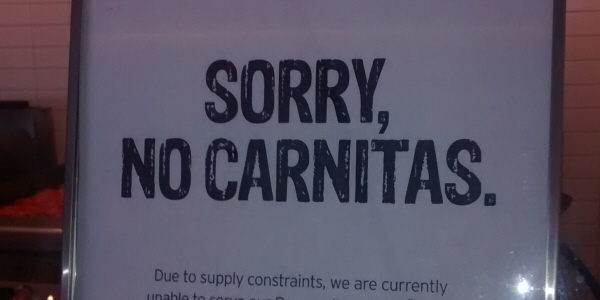In mid-January, many news outlets reported that Chipotle Mexican Grill (NYSE: CMG) had stopped serving its popular carnitas product at roughly a third of its 1,724 restaurants because it dropped one of its pork suppliers that did not meet its “Food With Integrity” standards. According to Chipotle’s website, its pork suppliers must allow their pigs to have access to outside spaces or place them in deep-bedded pens where they can move around and exhibit “natural tendencies.” They must also avoid using any antibiotics or growth hormones in the development/treatment.
When Chipotle officials discovered that one of its suppliers was not adhering to these standards during what the Associated Press calls a “routine supplier audit,” it removed the source from its supply chain. But, because this supplier made up such a large share of Chipotle’s pork supply, and because it was unable to line up alternative sources in time, Chipotle decided to pull its popular carnitas product from nearly 600 of its restaurants. Although Chipotle says that it is working with other suppliers to increase their pork supply and that it is open to reinstating the ousted supplier if/when it complies with Chipotle’s animal welfare standards, the popular fast-casual Mexican restaurant chain does not know when it will be able to put carnitas back on the menu at all of its franchises.
In the meantime, here are three supply management lessons that can be learned from “the Great Carnitas Shortage of 2015.”
- Supplier Audits also Matter: Press coverage indicates that Chipotle officials became aware of the supplier’s violations during a “routine” audit of their facilities. Whether this was, in fact, routine or a case where Chipotle officials were tipped off about the supplier’s transgressions, they were confirmed in an audit. Since the stakes are so high with its products, rather than place the supplier on probation or continue working with it while it cleaned up its practices, Chipotle ceased doing business with the supplier outright and immediately.
- (Some) Enterprises can Self-Regulate: Another lesson to be learned from this matter is that some enterprises can regulate their own business practices, impose, and most importantly, enforce loftier standards than official governing bodies. It’s a point that Elizabeth Weiss, writing for the New Yorker, made in 2013 – well before today’s “Great Carnitas Shortage.” After all, U.S. Department of Agriculture (USDA) regulations permit farmers and ranchers to employ antibiotics, hormones, and gestation crates on their farms, but their use violates Chipotle’s standards. While the supplier in question very likely met USDA standards, it clearly did not meet Chipotle’s standards. As a result, the supplier that was summarily dropped from Chipotle’s supply chain, lost a key customer, but it does not face any prosecution, except in the court of public opinion.
Conclusion
There are many lessons to be learned from the “Great Carnitas Shortage of 2015” (three today and a few more later this week). First these three lessons collectively demonstrate that there are businesses like Chipotle that are willing to uphold their corporate social responsibility and supplier conduct policies and commitments. When Chipotle found that a strategic supplier was not aligned with its brand, it quickly concluded that keeping the supplier was impossible because it determined that the potential damage to its brand and business from keeping the supplier outweighed any potential financial loss from cutting the supplier. Chipotle made a fast and decisive decision to drop the non-compliant supplier from its supply chain leaving many of its customers (at least, the ones who like carnitas) in the lurch. We will see what the impact of its decision ultimately will be – in the meantime, until Chipotle locates and onboards additional pork suppliers, many of its customers will have to go without any tasty carnitas.
RELATED ARTICLES
On Cotton: Understanding Risks in the Global Supply Chain
Are You “Dressed to Kill?” Strategies to Mitigate Risk in the Global Cotton Supply Chain
Are You “Dressed to Kill?” Airing the Dirty Laundry Hidden in the Global Cotton Supply Chain
Visibility: What Does it Mean for Category Managers?
Visibility: What Does It Mean for CPOs? (Part III)
Chief Procurement Officers in 2014: Procurement’s Convergence with Supply Risk Management

